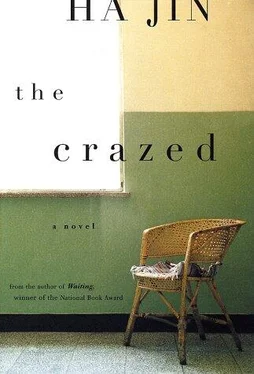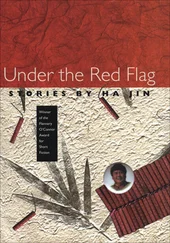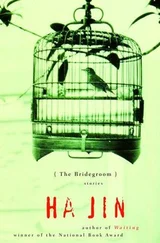Banping chuckled, but stopped right away, his buckteeth on his lower lip. He straightened up and put his notebook and fountain pen into his breast pocket.
I didn’t find anything funny in Mr. Yang’s story, which actually saddened me. My throat was constricting as I avoided looking at Banping.
On leaving, he whispered almost in my ear, “Come over for dinner tonight, will you? We’ll make dumplings. Weiya’s coming too.”
I nodded to agree. He and I were classmates and friends of sorts, and his one-room home in a dormitory house near the campus was a place where we often got together. Weiya Su was the other graduate student who had Professor Yang as her adviser. This year our teacher directed only the three of us in our graduate work, though he was on almost every master’s thesis committee in the department.
In his delirium Mr. Yang continued making noise. He was unusually agitated today. His head jerked as he went on groaning and gnashing his gums. In addition, the rhythm of his respiration changed drastically — one moment he breathed evenly, and another moment he panted as though running a race. What’s more, he seemed frightened by something or somebody, whining piteously every now and again. He mouthed some unintelligible words, which sounded like complaints or curses. His right hand kept rubbing his thigh, and his motion made the bed shake a little.
He might hurt his brain if he continued like this, so I decided to put him into bed, hoping he could fall asleep after he lay down. I went over and inserted my left arm under his legs, wrapped my right arm around his thick waist, and slowly moved him down. He didn’t seem to feel the downward movement and never stopped muttering and squirming.
It took me about five minutes to slide him back into bed. Sitting on the chair again, with my right leg over its arm, I began to review Japanese vocabulary. Hard as I tried, I couldn’t concentrate on the flash cards, distracted by Mr. Yang, who seemed to be quarreling with someone now. He sounded bellicose and from time to time gritted his teeth, which I knew indicated he was holding back his temper.
Despite my effort to focus on my work, I couldn’t help but observe his sweat-streaked face. Half an hour later, out of the blue, he burst into song. His singing baffled me, because to my mind he was born to teach seminars and deliver lectures. Who could’ve expected that Professor Yang would be singing this particular nursery rhyme?
To wear a flower
You pick a big red one,
To ride a horse
You mount a sturdy steed,
To sing a song
You praise great deeds,
To obey orders
You listen to the Party.
The song jolted me, and I felt the hair on the back of my head bristling. I hadn’t heard it for a long time. In spite of his gusto, Mr. Yang was no singer and sounded more like he was crowing.
No sooner had he finished singing than he added a shrill operatic chant, imitating drums, gongs, and cymbals: “Dong— chang, dong — chang, dong — dong — chang, chang — chang— chang, dong — dong — chang. .” He then let out a resounding belch, and his stomach growled as he clacked his tongue against the roof of his mouth. He seemed to be enacting a snatch from a Beijing opera, which had no bearing on the nursery rhyme.
I was actually more disturbed than baffled, as I remembered singing the rhyme with other children in the kindergarten over twenty years before. At that time it had been commonplace for us to chant such a song in raptures, but Mr. Yang’s singing now was so anachronistic and so out of context that it sounded ludicrous. Luckily for him, nobody but I had heard it.
Then, as if mocking my discomfort, he hit on another song. Eyes ablaze, he boomed:
The Proletarian Cultural Revolution
Is good, is good, is good, is good!
Workers are masters again.
Landowners, rich peasants,
Reactionaries, evildoers, rightists
Have no place to hide—
All will be swept away.
He bellowed the whole thing out as if he were under some kind of spell. His ferocious voice seemed to belong to someone else. I couldn’t imagine that an equable scholar like him would have anything to do with such a silly song. His singing made my scalp itch as I remembered hearing Red Guards chant it in my hometown. By so doing, those big boys and girls had contributed their little share to the revolution; but that had been two decades before, and now the song was no more than an embarrassing joke.
How had Mr. Yang learned this piece? I had been told that when the Cultural Revolution broke out, he was turned into a Demon-Monster, a target of the struggle, who would not have been entitled to sing such a progressive song together with the masses. Perhaps he had learned it on the sly, or he had heard others chant it so many times that it stuck in his mind.
Eyes shut, he resumed crooning the tune of the song, though its words were now disjointed and garbled. His singing sickened me. I put the flash cards on top of my bag that leaned against the leg of the chair, wondering how to stop him. He gave me the creeps. I looked at my watch— it was just past two o’clock. This was going to be a long afternoon.
“My heart is still good, pure and warm!” declared Mr. Yang. Without a pause he started another song. This time he not only was caroling but also seemed to be dancing around. His body wriggled a little as he mimicked a feminine voice:
There’s a golden sun in Beijing.
It brightens whatever it shines upon.
Ah, the light does not come
From the sky but from
Our Great Leader Chairman Mao!
While singing he flexed his toes, heaved his belly a little, and twisted his lips into a puerile smile. The instant he was done, he cried cheerfully, “See, I can sing it as well as any one of you. I can dance to it too. Let me show you.”
I went to him and placed my palm on his forehead, which was sweaty and burning hot. I patted his shoulder, but he turned his head aside and shouted ecstatically, “Don’t get in my way! Look, I can do it!” His right leg kicked, though he couldn’t raise it.
Should I wake him up? Though ridiculous, he seemed happy, grinning like a half-wit and licking his parched lips to wipe away the foam.
I decided to let him enjoy his hallucination for a while and returned to the wicker chair. By now he had calmed down a little, but he went on humming the tune of the song through his pink swollen nose. I remembered that about twenty years ago some kids, who were Small Red Guards and five or six years older than myself, had often performed the Loyalty Dance to this very song at restaurants, bus stops, inns, department stores, and the train station in my hometown in the Northeast. Chanting those words, they capered and sidled about, waving their hands above their heads; they kicked their heels, swung their legs, and bent their waists. Too young to participate, I watched them enviously. In hindsight they looked like crazed frogs wearing red armbands; yet at that time some of the kids were so sincere that, if asked, they would have sacrificed their lives for Chairman Mao without second thoughts. But Mr. Yang was a reactionary intellectual then and must have been forbidden to join the revolutionary masses in any celebration and propaganda activities. Could he really know such a dance? I didn’t think so.
“Ah, who can tell I always have a loyal heart!” he said and smacked his lips. “Come, just watch me.” He started the tune again, his legs kicking slowly and his arms jerking on the crumpled sheet. Not only the bed but also the floor, whose boards buckled in places, creaked now. He wiggled more and more rhythmically while a radiant smile broke on his face. He seemed beside himself with joy.
Читать дальше

![Lao Zi - Dao De Jing [Tao Te Ching] (english)](/books/3890/lao-zi-dao-de-jing-tao-te-ching-english-thumb.webp)
![Lao Zi - Dao De Jing [Tao Te Ching] (chinese)](/books/3891/lao-zi-dao-de-jing-tao-te-ching-chinese-thumb.webp)
![Lao Zi - Dao De Jing [Tao Te Ching] (espanol)](/books/3892/lao-zi-dao-de-jing-tao-te-ching-espanol-thumb.webp)







